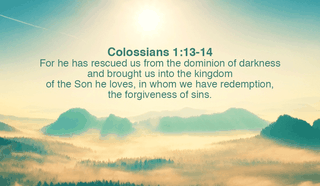
- Recent Translations
- All Translations
Kolosser 1
Share
Settings
Kolosser 1 Commentary
Chapter 1
This epistle was sent because of some difficulties which arose among the Colossians, probably from false teachers, in consequence of which they sent to the apostle. The scope of the epistle is to show, that all hope of man's redemption is founded on Christ, in whom alone are all complete fulness, perfections, and sufficiency. The Colossians are cautioned against the devices of judaizing teachers, and also against the notions of carnal wisdom, and human inventions and traditions, as not consistent with full reliance on Christ. In the first two chapters the apostle tells them what they must believe, and in the two last what they must do; the doctrine of faith, and the precepts of life for salvation.
The apostle Paul salutes the Colossians, and blesses God for their faith, love, and hope. (1-8) Prays for their fruitfulness in spiritual knowledge. (9-14) Gives a glorious view of Christ. (15-23) And sets out his own character, as the apostle of the Gentiles. (24-29)
Verses 1-8 All true Christians are brethren one to another. Faithfulness runs through every character and relation of the Christian life. Faith, hope, and love, are the three principal graces in the Christian life, and proper matter for prayer and thanksgiving. The more we fix our hopes on the reward in the other world, the more free shall we be in doing good with our earthly treasure. It was treasured up for them, no enemy could deprive them of it. The gospel is the word of truth, and we may safely venture our souls upon it. And all who hear the word of the gospel, ought to bring forth the fruit of the gospel, obey it, and have their principles and lives formed according to it. Worldly love arises, either from views of interest or from likeness in manners; carnal love, from the appetite for pleasure. To these, something corrupt, selfish, and base always cleaves. But Christian love arises from the Holy Spirit, and is full of holiness.
Verses 9-14 The apostle was constant in prayer, that the believers might be filled with the knowledge of God's will, in all wisdom. Good words will not do without good works. He who undertakes to give strength to his people, is a God of power, and of glorious power. The blessed Spirit is the author of this. In praying for spiritual strength, we are not straitened, or confined in the promises, and should not be so in our hopes and desires. The grace of God in the hearts of believers is the power of God; and there is glory in this power. The special use of this strength was for sufferings. There is work to be done, even when we are suffering. Amidst all their trials they gave thanks to the Father of our Lord Jesus, whose special grace fitted them to partake of the inheritance provided for the saints. To bring about this change, those were made willing subjects of Christ, who were slaves of Satan. All who are designed for heaven hereafter, are prepared for heaven now. Those who have the inheritance of sons, have the education of sons, and the disposition of sons. By faith in Christ they enjoyed this redemption, as the purchase of his atoning blood, whereby forgiveness of sins, and all other spiritual blessings were bestowed. Surely then we shall deem it a favour to be delivered from Satan's kingdom and brought into that of Christ, knowing that all trials will soon end, and that every believer will be found among those who come out of great tribulation.
Verses 15-23 Christ in his human nature, is the visible discovery of the invisible God, and he that hath seen Him hath seen the Father. Let us adore these mysteries in humble faith, and behold the glory of the Lord in Christ Jesus. He was born or begotten before all the creation, before any creature was made; which is the Scripture way of representing eternity, and by which the eternity of God is represented to us. All things being created by Him, were created for him; being made by his power, they were made according to his pleasure, and for his praise and glory. He not only created them all at first, but it is by the word of his power that they are upheld. Christ as Mediator is the Head of the body, the church; all grace and strength are from him; and the church is his body. All fulness dwells in him; a fulness of merit and righteousness, of strength and grace for us. God showed his justice in requiring full satisfaction. This mode of redeeming mankind by the death of Christ was most suitable. Here is presented to our view the method of being reconciled. And that, notwithstanding the hatred of sin on God's part, it pleased God to reconcile fallen man to himself. If convinced that we were enemies in our minds by wicked works, and that we are now reconciled to God by the sacrifice and death of Christ in our nature, we shall not attempt to explain away, nor yet think fully to comprehend these mysteries; but we shall see the glory of this plan of redemption, and rejoice in the hope set before us. If this be so, that God's love is so great to us, what shall we do now for God? Be frequent in prayer, and abound in holy duties; and live no more to yourselves, but to Christ. Christ died for us. But wherefore? That we should still live in sin? No; but that we should die to sin, and live henceforth not to ourselves, but to Him.
Verses 24-29 Both the sufferings of the Head and of the members are called the sufferings of Christ, and make up, as it were, one body of sufferings. But He suffered for the redemption of the church; we suffer on other accounts; for we do but slightly taste that cup of afflictions of which Christ first drank deeply. A Christian may be said to fill up that which remains of the sufferings of Christ, when he takes up his cross, and after the pattern of Christ, bears patiently the afflictions God allots to him. Let us be thankful that God has made known to us mysteries hidden from ages and generations, and has showed the riches of his glory among us. As Christ is preached among us, let us seriously inquire, whether he dwells and reigns in us; for this alone can warrant our assured hope of his glory. We must be faithful to death, through all trials, that we may receive the crown of life, and obtain the end of our faith, the salvation of our souls.
Kolosser 1 Commentaries
Chapter Summary
INTRODUCTION TO COLOSSIANS
The Colossians, to whom this epistle is written, were not the Rhodians, by some called Colossians, from Colossus, the large statue of the sun, which stood in the island of Rhodes, and was one of the seven wonders of the world; but the inhabitants of Colosse, a city of the greater Phrygia, in the lesser Asia, near to which stood the cities of Laodicea and Hierapolis, mentioned in this epistle. Pliny {a} speaks of it as one of the chief towns in Phrygia, and {b} Herodotus calls it the great city of Phrygia; it is said to have perished a very little time after the writing of this epistle, with the above cities, by an earthquake, in the year of Christ 66, and in the tenth of Nero {c}; though it was afterwards rebuilt; for Theophylact says, that in his time it was called Chonae. When the Gospel was brought hither, and by whom, is not known, nor who was the founder of the church in this place; for the Apostle Paul was not, since his face had never been seen by them, Col 2:1, though it is said that Epaphras, the same name with Epaphroditus, was fixed by him pastor of this church; and others say Philemon was set over it by him. The occasion of this epistle was this, Epaphras, who had preached the Gospel to the Colossians, and very likely was the first that did, came to Rome, where the Apostle Paul was a prisoner, and gave him an account of them, how they had heard and received the Gospel, and of their faith Christ, and love to the saints; and also declared to him in what danger they were through some false teachers that had got among them, who were for introducing the philosophy of the Gentiles, the ceremonies of the law of Moses, and some pernicious tenets of the followers of Simon Magus, and the Gnostics; upon which the apostle writes this epistle to them, to confirm them in the faith of the Gospel Epaphras had preached unto them, and which was the same he himself preached; and to warn them against those bad men, and their principles; and to exhort them to a discharge of their duty to God, and men, and one another. It was written by the apostle, when in bonds at Rome, as many passages in it show, and about the same time with those to the Philippians and Ephesians; and the epistle to the latter greatly agrees with this, both as to subject and style. Dr. Lightfoot places it in the year of Christ 60, in the second of the apostle's imprisonment, and in the sixth of Nero's reign.
{a} Nat. Hist. l. 5. c. 32. {b} Polymnia, l. 7. c. 30. {c} Eusebius in Chron.
\\INTRODUCTION TO COLOSSIANS 1\\
This chapter contains the inscription of the epistle; the apostle's usual salutation; his thanksgiving to God on behalf of the Colossians for grace received; his prayers, that more might be given them; an enumeration of various blessings of grace, which require thankfulness, in which the glories and excellencies of Christ are particularly set forth: and it is concluded with an exhortation to a steadfast adherence to the Gospel, taken from the nature, excellency, and usefulness of the ministry of it. The inscription, and the salutation, are in Col 1:1,2, and are the same with those in the epistle to the Ephesians, only Timothy is joined with the apostle here, and the Colossians have the additional character of brethren given them. The thanksgiving is in Col 1:3-5, the object of it is God, the Father of Christ; the time when made, when in prayer to him; its subject matter, the faith and love of the saints; to which is added, their happiness secured for them in heaven, their hope was conversant with: and whereas the Gospel was the means by which they came to the hearing and knowledge of it, this is commended from the subject of it, the doctrine of truth; from the spread of it in the world; and from its efficacy in bringing forth fruit in all, to whom it came in power, and that with constancy, Col 1:5,6, and also from the testimony of Epaphras, a faithful minister of Christ, and theirs, who was dear to the apostle, and of whom he had the above account of them, Col 1:7,8. And then follow his prayers for them, that they might have an increase of spiritual knowledge, and that they might put in practice what they knew; and for that purpose he entreats they might be blessed with strength, patience, and longsuffering, Col 1:9-11. And in order to excite thankfulness in himself and them, he takes notice of various blessings of grace; of the Father's grace in giving a meetness for eternal glory and happiness, by delivering from the power of darkness, and translating into the kingdom of his Son, Col 1:12,13, and of the Son's grace in obtaining redemption by his blood, and procuring the remission of sins, Col 1:14, which leads the apostle to enlarge upon the excellencies of the author of these blessings, in his divine person, as the image of God, and the first cause of all created beings, Col 1:15, which he proves by an enumeration of them, as created by him, and for his sake, by his pre-existence to them, and their dependence on him, Col 1:16,17, and in his office capacity, as Mediator, being the head of the church, the governor of it, and the first that rose from the dead; by all which it appears that he has, and ought to have the pre-eminence, Col 1:18. And this is still more manifest from his having all fulness dwelling in him, to supply his body the church, of which he is the head, Col 1:19, and from the reconciliation of all the members of it to God by him, Col 1:20, which blessing of grace is amplified partly by the subjects of it, who are described by their former state and condition, aliens and enemies, and by their present one, reconciled by the death of Christ in his fleshly body; and partly by the end of it, the presentation of them holy, blameless, and irreprovable in the sight of God, Col 1:21,22. Wherefore it is a duty incumbent on such to abide by the Gospel of Christ, which brings the good tidings of peace and reconciliation, and is the means of faith and hope; and the rather, since they had heard it themselves, and others also, even every creature under heaven; and the apostle was a minister of it, Col 1:23, and on his ministration of it he enlarges, by observing his sufferings for the church on account of the Gospel, which he endured with pleasure; and therefore they should, by his example, be encouraged to continue in it, Col 1:24. Moreover, he argues the same from his commission of God to preach it for their sakes, Col 1:25, and from the nature and subject matter of it, being a hidden mystery, and containing riches and glory in it; yea, Christ himself, the foundation of hope of eternal glory, Col 1:26,27, and from the end of preaching it, which was to present every man perfect in Christ; which end the apostle laboured and strove to obtain through the power and energy of divine grace, which wrought in him, and with him, Col 1:28,29.

